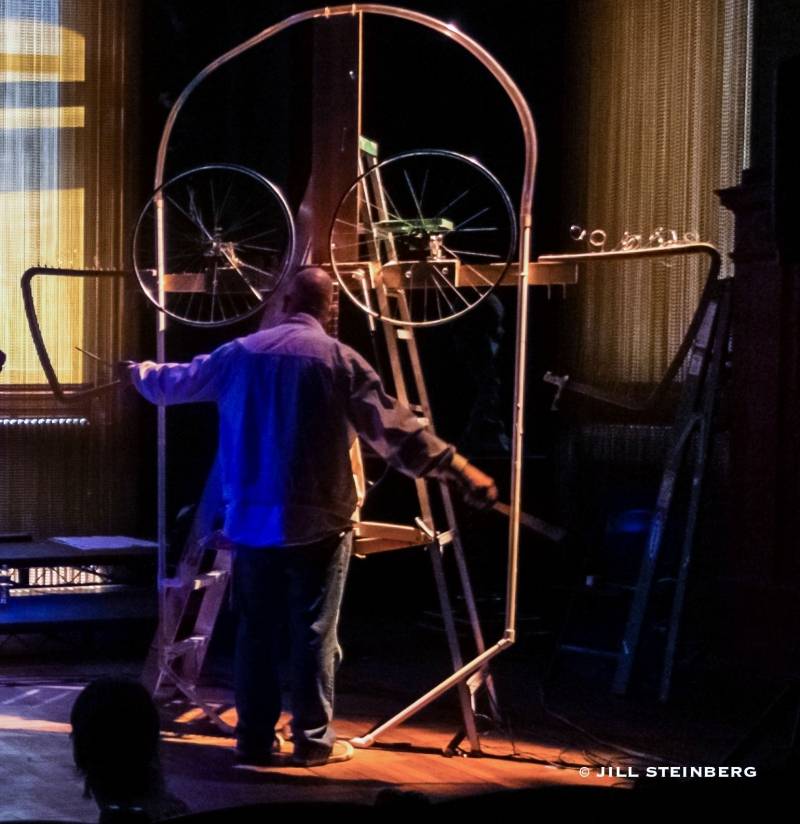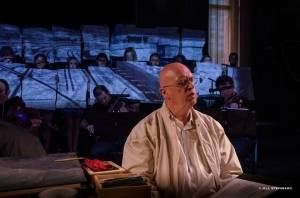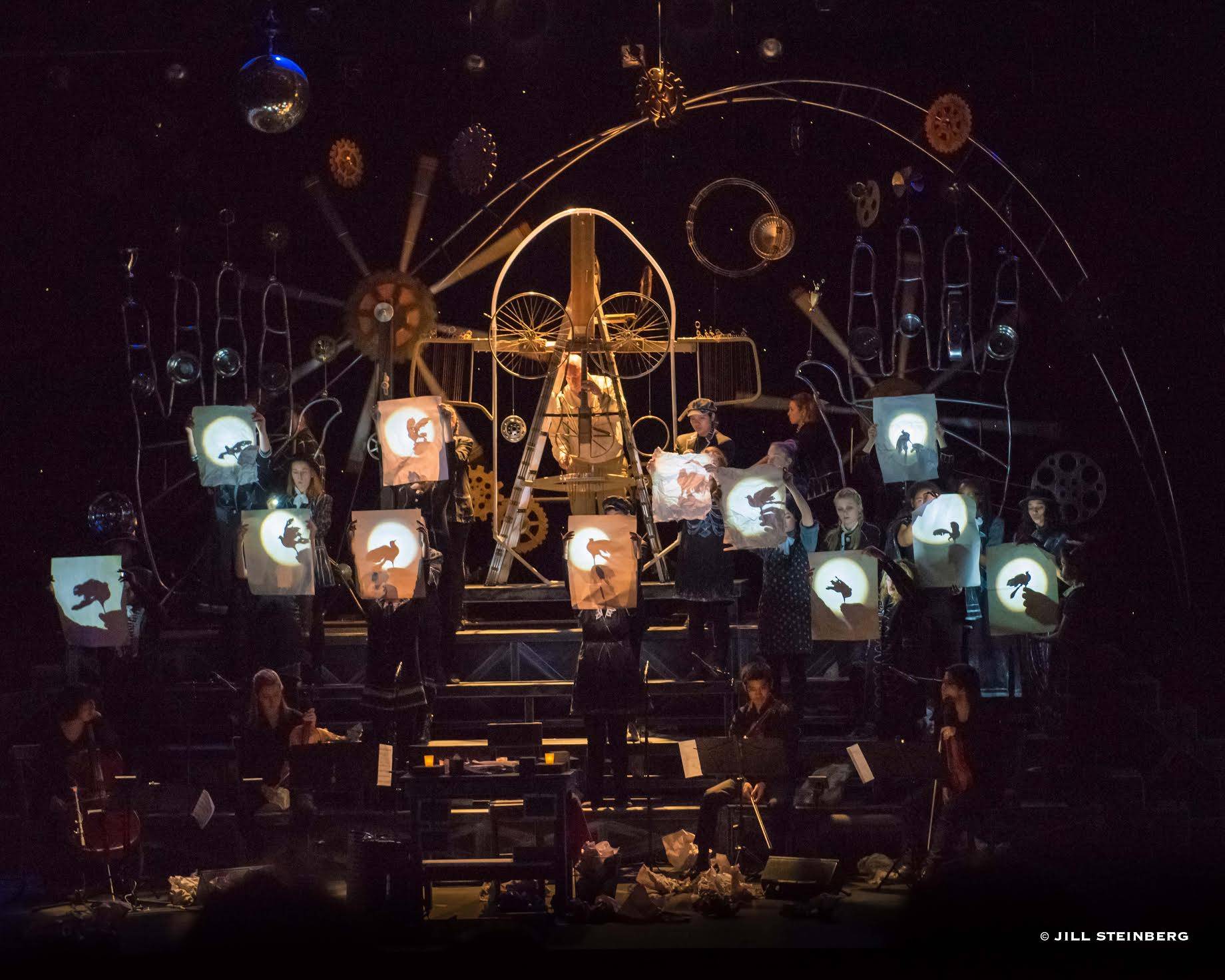For the past two weeks, as I glanced through and then thoroughly searched for reference materials about Beth Morrison Projects and Vision Into Art’s production, The Aging Magician, every image I came across struck me in two particular manners. First, there was an intriguing, unique other-ness about the stage and set that made me feel playful and invited me to explore; it was quickly followed by that tip-of-my-tongue familiarity that I just couldn’t name, but I knew, dammit, I knew. It wasn’t until my e-mailed questions were answered by creator and composer Paola Prestini, who mentioned the name Joseph Cornell, that I fit it all together.
According to Prestini, Cornell himself is a secondary influence: he’s the subject of a collection of short fiction titled A Convergence of Birds, edited by Jonathan Safran Foer, containing stories all connected in some way to Cornell, including Foer’s own contribution “If the Aging Magician Should Begin to Believe”. It was this story that inspired Prestini to write the tale of a solitary man in a demanding job, writing down his dreams as he nears the end of his life, and drifting off as he rides the F train to Coney Island. It’s a beautiful story, a classic and universal tale. And when I look at the photos of it, now, I see a Cornell box.

Director Julian Crouch designed the set, collaborating with Mark Stewart, who designs and creates instruments, to dress the stage with elaborate metal sculptures that can be played by plucking, spinning, and striking. Other instruments, such as the “velavoci”, which Prestini describes as “gorgeous helicopters that sound like angelic choirs”, are Stewart’s original creations which Crouch fashioned into (no, literally, IN-to) an imaginary Coney Island.
I was lucky enough to see an entire exhibit of Cornell boxes at The Art Institute of Chicago, and that was the familiar note the image of the set was hitting. I remembered how delicate and intricate, mechanical and functional, playful and lovely each shadowbox of found Victorian treasures appeared to be. Some of them still worked, and were set up allowing the public to play with them even though they were over 50 years old and made with materials from two turns of the century previous. Placed inside most of them was a bird — usually only one — and very prominently within the tableau.
 Likewise, with The Aging Magician, we are graced with one “bird”, Harold, played by Rinde Eckert, who also wrote both the story and some of his own vocal parts hand-in-hand with the composer. Prestini cites Eckert himself as a large part of her inspiration for this work, saying, “Since seeing Rinde’s amazing And God Created Great Whales twenty years ago while still a student, I knew I needed to write for him. This piece felt perfect in that Rinde can carry a whole show because of his wide array of gifts: he’s a tremendous singer, actor, mover.” He is also a composer, so once he was involved, it was natural that he would sometimes fit in words, despite it being, “indeed a backward process” for Prestini. Eckert, using the framework of the Foer story, which in turn is based on Charon crossing the river Styx, shaped the script over several attempts, similarly to his main character Harold, who is also a writer.
Likewise, with The Aging Magician, we are graced with one “bird”, Harold, played by Rinde Eckert, who also wrote both the story and some of his own vocal parts hand-in-hand with the composer. Prestini cites Eckert himself as a large part of her inspiration for this work, saying, “Since seeing Rinde’s amazing And God Created Great Whales twenty years ago while still a student, I knew I needed to write for him. This piece felt perfect in that Rinde can carry a whole show because of his wide array of gifts: he’s a tremendous singer, actor, mover.” He is also a composer, so once he was involved, it was natural that he would sometimes fit in words, despite it being, “indeed a backward process” for Prestini. Eckert, using the framework of the Foer story, which in turn is based on Charon crossing the river Styx, shaped the script over several attempts, similarly to his main character Harold, who is also a writer.
Harold is a writer. And a clockmaker. And a puppeteer, and a cyclist, and a dutiful son, and an accordion player. And above all, a dreamer. The one thing he isn’t, however, is an actual magician, although the main character of his novel-in-progress is a magician with an apprentice. The aging magician he is writing has found the person to whom he will pass all his secrets, and the audience is invited to watch Harold in his attempt to do the same through the writing. It may seem like a small story to tell, but it is common in that the majority of us desire it. Prestini expands on this premise with a story of her own:
“I think life is all about the small things, the details. As artists we are often working for a cause, or a greater dream, and that can feel like you’re a balloon floating above your life. But it’s the everyday things that bring you back to what’s important. The subway and peculiar lives that flash in front of you; the everyday stories of people in your family — their troubles and joys. This is what one works for. I wrote this piece for a special person in my life named Gus. He is in his late eighties and was quite successful in his life, but he always wanted to sing. Getting old is hard, and there is something about Harold grappling with everyday life, his dreams, and ultimately death, that to me, is absolutely beautiful to watch. His inner world unfolds throughout the show, aided by the choir, and we see the richness that imagination and dreaming color everyday life with.”
As we watch and see, his mental chorus will be embodied by the Brooklyn Youth Chorus, who make up the vocal background as well as the physical one, often creating the stage’s backdrop from papers they hold, and creating props alongside the performer. And as interesting as the built-in instruments are, the music will be fleshed out by a string quartet from American Contemporary Music Ensemble.

The title phrase from this article is often attributed to Cornell, who scoured estate sales and secondhand shops specifically for items that were used and valued, but no longer needed. He would save each item until he found it a resonant home, with like items — a collaboration, if you will. After learning more about this production, I’m convinced that the collaborators — Prestini, Eckert, and Crouch — have found a resonant home for this character and his story.
———
The Aging Magician is a single-night engagement, showing only at 7:30 p.m. on Saturday, April 2 in the Colwell Playhouse at Krannert. Tickets start at $29, with discounts available for seniors, students, UI & youth, and are available for purchase online, at the Ticket Office, or by calling 1-800-KCPATIX.
All photographs by Jill Steinberg via Vision Into Art.
Editor’s note: the original version of this article failed to mention the involvement of Beth Morrison Projects, an oversight for which we apologize.
About Rebecca Knaur…
Editor of Smile Politely’s Arts section, rk makes a habit of drinking mind-altering beverages while writing opinions to be published. She has a highly developed sense of grammar and syntax, but little to no content filter. You can follow her on Twitter, @rknaur, but she rarely checks it, so feel free to reiterate tweets when you see her in person.









 About Rebecca Knaur…
About Rebecca Knaur…